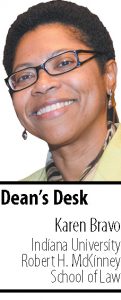Subscriber Benefit
As a subscriber you can listen to articles at work, in the car, or while you work out. Subscribe Now The COVID-19 pandemic has affected and disrupted lives, professions and industries throughout the globe. For many, your personal and professional lives were abruptly converted to the virtual plane in March 2020. Aspects of that transformation continue today, even if you and your colleagues have returned to your physical offices.
The COVID-19 pandemic has affected and disrupted lives, professions and industries throughout the globe. For many, your personal and professional lives were abruptly converted to the virtual plane in March 2020. Aspects of that transformation continue today, even if you and your colleagues have returned to your physical offices.
The Indiana University Robert H. McKinney School of Law shared in that experience. The pandemic affected virtually every aspect of the ways in which we educate and train our students and transform them into the next generation of lawyers. In response, we articulated the goal that the law school would thrive — not merely survive. During the pandemic, we stared down unprecedented challenges in meeting that goal while centering the health and safety of our community. Let me share a few of the many successes of the students, faculty and staff.
Following our abrupt pivot to a 100% remote environment, our law school community came together to identify and map out the ways in which we would overcome challenges to our mission. To that end, while engaging in immediate responses, our faculty and staff volunteers came together in task forces focused on every aspect of our operations. One example of a well-thought-out and successful response is the collaboration between our technology services department and professor Max Huffman,
IU McKinney’s director of online learning. Their work produced, among other things, a summer-long “boot camp” on online teaching methodologies for IU McKinney faculty members. The conferral of the IU McKinney Outstanding Administrative Staff Award to the technology services department and the Faculty Leadership Award to professor Huffman honored them for their leadership and expressed the IU McKinney community’s gratitude.
All hands were on deck during summer 2020 as we planned our fall reopening. We navigated regulatory, health and other considerations (including measurement of distances within classrooms with a 6-foot metal pole) to provide a robust hybrid course of education to IU McKinney students. Full-time, first-year students’ courses were 50% online and 50% in-person, while evening students’ classes were fully in-person. Upper-level students were able to select among in-person and online class offerings. Our faculty taught students in fully masked, socially distanced classrooms, and students spontaneously created online communities to overcome the restraints and strictures of social distancing.
In many ways, the pandemic taught our students an invaluable lawyering skill: how to cope with disruption and fashion innovative responses. For example, when the need to maintain social distancing canceled an intellectual property law-related externship, one IU McKinney student joined with alumni and professor Xuan-Thao Nguyen to start the Intellectual Property Law Clinic, which operates under the United States Patent and Trademark Office’s Law School Clinic Certification Program. This clinic, which will continue post-pandemic, allows students to gain practical, collaborative experiences in drafting, filing and prosecuting trademark and patent applications for real-world clients, all while still in law school.
Our students also continued to demonstrate and live their commitment to social justice. One example is their participation in the Re-Entry and Community Help Program, also known as REACH. The effort is run by the U.S. District Court for the Southern District of Indiana. Professor Lahny Silva, one of its co-founders, leads the effort at IU McKinney. Through this program, students work with people who were formerly incarcerated to remove the barriers to a successful reentry into society. Students who participated in the Second Chance Re-Entry Program, an IU McKinney student group, continued to provide food, clothing, housing and help in finding employment to people who were recently released. The student group partnered with a community organization to continue their work and offer services in a virtual format.
Students also saw successes in court. Under the guidance of professors Carrie Hagan, Joel Schumm and Fran Watson, respectively, students in our Civil Practice Clinic won yet another expungement case on appeal for a client; the Appellate Clinic won another case, this one for a juvenile client; and the Wrongful Conviction Clinic was victorious in its efforts on behalf of a client in arguing for a new trial. These are just a few of the many examples I could cite from this academic year.
It has been a challenging time for the entire IU McKinney community, during which we confronted the important issues of justice and democracy, experienced economic dislocation and Zoom fatigue, and dealt with social isolation and anxiety. Through it all, our students, faculty and staff persisted and thrived, demonstrating commitment and resilience in the face of unprecedented crises.
Following our hybrid year, we were able to celebrate our 2021 graduates twice and our 2020 graduates once in May at a campus-wide, in-person commencement ceremony at Carroll Stadium, and via a live webinar during which we shared a toast and together watched a special video honoring all our 2021 graduates. While family and friends could only attend the live event remotely, everyone could join in the viewing party for our webinar. The joy on the students’ faces and the faces of their families was evident for all to see. While these have been unprecedented times, I am confident the challenges and their legal educations have prepared our newest IU McKinney lawyers to successfully navigate their futures.
As we look forward to the new academic year in a post-pandemic, in-person format, we will implement the lessons we learned and continue to build on our law school’s strong foundations.•
• Karen Bravo is dean and the Gerald L. Bepko professor of law at Indiana University Robert H. McKinney School of Law. Opinions expressed are those of the author.
Please enable JavaScript to view this content.
